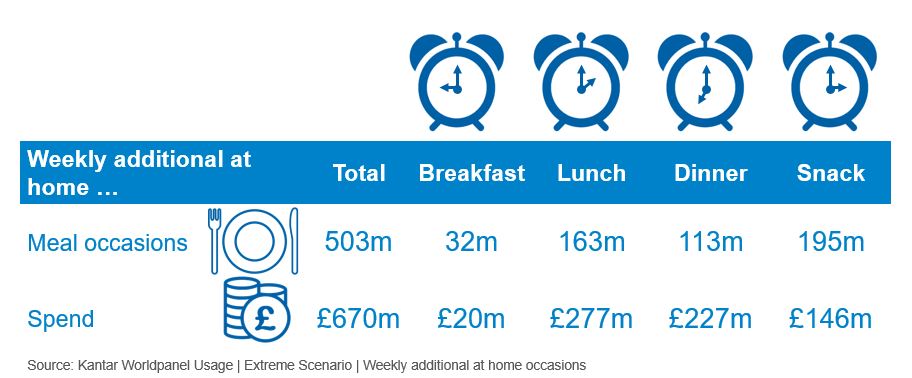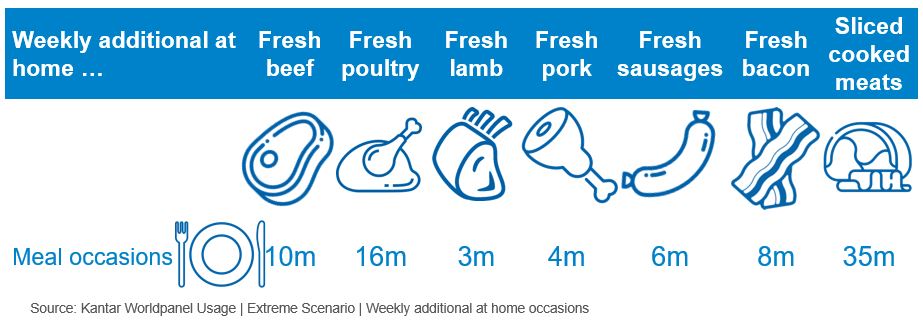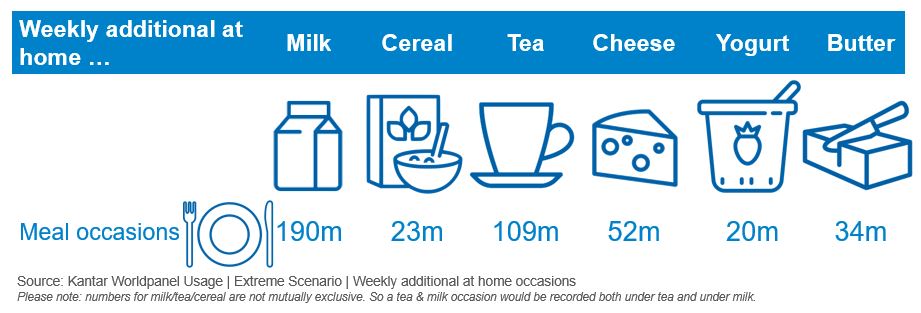
Written by Iain Hoey
A new article from AHDB has been released which examines the possible long term changes in eating habits that are likely be occur as a result of the Covid-19 outbreak.
The key point highlighted by the article is that the vast majority of meals, with the exception of those consumed by key workers, will now be consumed at home, allowing consumers more time to prepare their food and more basic ingredients will be purchased from grocery. However, meals made and eaten at home are expected to be less complex in comparison to meals eaten out of home and whilst there may only be minor changes in the volume of food eaten, the shape that food will take could change drastically.
Steven Evans, senior consumer insight manager at AHDB, says that ingredients for family favourites such as Italian, stews and meals which are simple, hearty, filling or comforting treats for families are likely to see the biggest uplift in sales.
Data from Kantar Worldpanel estimates that 503 million more in-home meals will be eaten per week in this lockdown period, a rise of 38% and an estimated increase in spending of £670m. In the article, Evans breaks down where this additional money is likely to be spent.

Meat
The article predicts that sliced cooked meats are estimated to feature in an additional 35 million more meals a week, with 91% of this growth predicted at lunchtime. Ham is expected to be the biggest beneficiary as it currently holds the largest slice of the category.
Fresh beef is likely to feature in ten million more at-home meals per week, and pork is expected to feature in four million more meals per week. Fresh poultry is expected to feature in 16 million more meals, lamb is predicted to feature in three million more meals.
Fresh bacon will be served at eight million more meals per week. Chilled burgers and grills will be boosted by an additional one million meals per week. Mince will feature in six million more meals, and roasting joints will feature in five million additional occaisions.
Overall, all categories of meat are expected to see a rise of between 20 and 72 per cent .

Potatoes
The estimated uplift for fresh/raw potatoes is 34 million occasions per week. Categories like frozen potatoes will benefit more from evening meals accounting for 67% of the anticipated rise of 16 million occasions per week. The average estimated uplift across fresh and frozen potatoes products is 33%.
Dairy
Kantar estimates an increase of 190 million occasions per week of milk, largely driven by more teas, coffees and cereal being eaten in the home.
Cheese is expected to see a rise of 52 millions weekly occasions, the majority (71%) at lunch time.

Long term impacts
As consumers are unlikely to replicate meals eaten in restaurants at home, while the volume of meat, veg and dairy is not likely to see much change, the form these meal elements will take are likely to change drastically as consumers will favour easy-to-cook ingredients.
Steven Evans said that the current lockdown will likely have ripple effects further down the line after it has been lifted, and that looking at historic events will go some way to informing how this might look.
He said: “For instance, in the credit crunch of 2007/2008 markets saw big spikes of in-home meal occasions. Foodservice struggled as people faced tough economic circumstances, but there were trade up opportunities in retail. Many shoppers remained price conscious but a fancy in-home meal kit can still be cost effective when compared to dining out with the family.
“To a certain extent the Covid-19 pandemic and potential economic ripple effect to consumers may well fast track some of the recessionary behaviour which Kantar observed and AHDB reported on initially during Brexit uncertainty.
“Adapting to consumers demand is really challenging when the size of the shift in lockdown has never been seen before. Adapting and evolving as the consumer needs change over the coming months will be pivotal to long term success.”
Get Our E-Newsletter - breaking news to your in-box twice a week
See e-newsletter example
Will be used in accordance with our Privacy Policy
Continue reading on the Farm Business Website...





